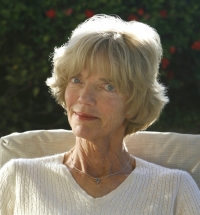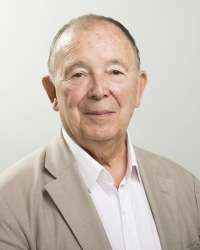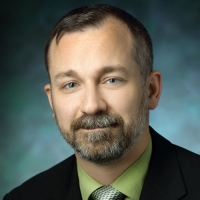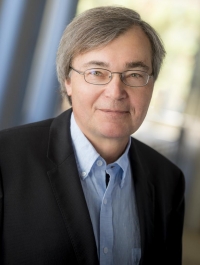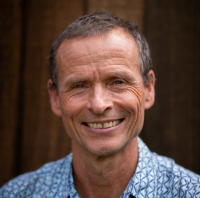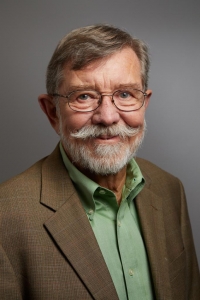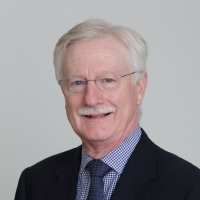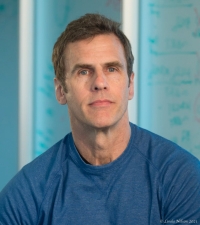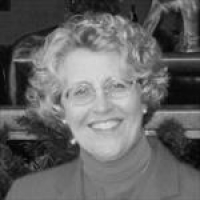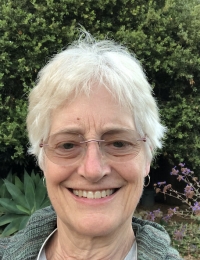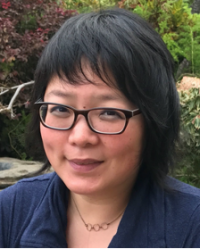Altered States of the Human Mind: Implications for Anthropogeny
Biographical Sketches: Co-Chairs
University of California, San Diego
Patricia Smith Churchland is a neurophilosopher, now retired from the University of California San Diego, and an Adjunct Professor at the Salk Institute. She focuses on how discoveries in neuroscience impact traditional ideas about ourselves and how philosophers can usefully collaborate with scientists. She wrote the pioneering book, Neurophilosophy (MIT Press, 1986), and is co-author with T. J. Sejnowski of The Computational Brain (MIT Press, 1992). Her current work focuses on morality and the social brain: Braintrust: What Neuroscience tells us about Morality (Princeton University Press, 2011) and Conscience: The Origins of Moral Intuition (W. W. Norton & Company, 2019). She won a MacArthur Prize in 1991, the Rossi Prize for neuroscience in 2008, and the Prose Prize for science for Braintrust.
Extended interviews can be found on YouTube, The Science Network, and on Serious Science.
Collège de France & Institut Pasteur
Jean-Pierre Changeux is Honorary Professor at the Collège de France & Pasteur Institute Paris and International Faculty, Kavli Institute for Brain & Mind, University of California San Diego. At the advent of the era of molecular biology, Jean-Pierre Changeux pioneered the study of the role of conformational changes linking topographically distinct sites in regulatory processes. His PhD studies, carried under the supervision of Jacques Monod, provided the experimental and conceptual bases for the formal model of allosteric interactions in regulatory proteins, subsequently put forward in a joint paper that had become one of the most quoted papers of the scientific literature. Throughout a long career, Changeux has consistently built upon and extended his early theory, to spawn many new and flourishing fields of investigation.
His main contributions and discoveries in the course of the past 50 years are centered on the general theme of receptors and their allosteric transitions, primarily in the nervous system and were initiated by the first identification of a neurotransmitter receptor: the nicotinic acetylcholine receptor. He combined approaches from supposedly disparate disciplines of pharmacology, molecular biology and developmental biology as well as behavioural and pathological studies, as and when required, to demonstrate that the nicotinic receptor is a bona fide allosteric protein. He further elucidated the molecular mechanism through which drugs modulate receptor efficacy when binding to distinct allosteric sites thereby opening a revolutionary new avenue in the field of drug discovery.
His contributions to understanding the regulation of acetylcholine receptors in turn contributed to advancing our understanding of the nature of long-term synaptic plasticity within neural networks and on the neural bases of cognitive functions up to conscious processing. The consequences for human pathology are immense: from the understanding of drug addiction to the therapeutics of neuropsychiatric diseases.
The publication of his book Neuronal Man: The Biology of The Mind in 1985 brought Changeux celebrity status among the wider public. Since then he has authored or co-authored several other books notably, Conversations on Mind Matter and Mathematics with the mathematician Alain Connes (1998), What Makes Us Think with the philosopher Paul Ricoeur (2002), Physiology of truth (2005),The Enchanted Neurons with the composers P.Boulez and P.Manoury (2019) which initiated an instructive dialogue between neuroscience and other disciplines.
Jean-Pierre Changeux’s academic accolades include the Gairdner foundation award in 1978, the Wolf prize in 1983, the Louis Jeantet Prize for Medicine in 1993, the Balzan Prize in 2001, the National Academy of Sciences Award in Neurosciences USA in 2007, the Olav Thon international research award in biomedicine, Oslo, Norway, 2016, the Albert Einstein World Award of Science, Hong Kong, 2018.
Biographical Sketches: Speakers
Johns Hopkins School of Medicine
Frederick Barrett is Associate Professor of Psychiatry and Behavioral Science at Johns Hopkins University School of Medicine, and Director of Neurophysiological Mechanism and Biomarker Assessment at the Johns Hopkins Center for Psychedelic & Consciousness Research. He is a cognitive neuroscientist with training in behavioral pharmacology. Dr. Barrett has been conducting psychedelic research at Johns Hopkins University since 2013, and his research in heathy participants and in patients with mood and substance use disorders focuses on the psychological and neurological mechanisms underlying the enduring therapeutic and other effects of psychedelic drugs. In 2017, he received an NIH “R03” grant as Principal Investigator to investigate biological mechanisms of psilocybin effects, the first federally funded research since the 1970s administering a classic psychedelic to people with psychedelic effects as the primary focus. He published the first studies in humans characterizing the enduring effects of psilocybin on the brain (up to a month after psilocybin administration), the effects of psilocybin on a brain structure called the claustrum (which has been proposed to variously mediate consciousness and cognition), the effects of LSD on the brain's response to music, and the effects of the atypical hallucinogen salvinorin A on human brain network function. He is currently leading a clinical trial to investigate the use of psilocybin to treat patients with major depressive disorder and co-occurring alcohol use disorder, and he is leading a number of ongoing studies aimed at better understanding the psychological, biological, and neural mechanisms underlying therapeutic efficacy of psychedelic drugs.
UC San Diego
Thomas J. Csordas is Distinguished Professor in the Department of Anthropology at UC San Diego, where he holds the Dr. James Y. Chan Presidential Chair in Global Health. He serves as Founding Director of the Global Health Program and Director of the UCSD Global Health Institute. His research interests include medical and psychological anthropology, global mental health, anthropological theory, comparative religion, cultural phenomenology and embodiment, globalization and social change, and language and culture. He has conducted ethnographic research among Charismatic Catholics, Navajo Indians, adolescent psychiatric patients in New Mexico, and Catholic exorcists in the United States and Italy. He is author of The Sacred Self: A Cultural Phenomenology of Charismatic Healing (1994); Language, Charisma,and Creativity (1997); Body/Meaning/Healing (2002); Transnational Transcendence: Essays on Religion and Globalization (2009); Engaging Evil: A Moral Anthropology (with William C. Olsen, 2019); Troubled in the Land of Enchantment (with Janis H. Jenkins, 2020).
UC San Diego
Pascal Gagneux is CARTA's Executive Co-Director, a Professor of Pathology and Anthropology, and the Department Chair of Anthropology at UC San Diego. He is interested in the evolutionary mechanisms responsible for generating and maintaining primate molecular diversity. The Gagneux laboratory studies cell-surface molecules in closely related primates species. His focus is on glycans, the oligosaccharides attached to glycolipids and glycoproteins of the surfaces of every cell and also secreted into the extra-cellular matrix. Gagneux's laboratory is exploring the roles of molecular diversity in protecting populations from pathogens as well as potential consequences for reproductive compatibility. Dr. Gagneux’s interest is in how glycan evolution is shaped by constraints from endogenous biochemistry and exogenous, pathogen-mediated natural selection, but could also have consequences for sexual selection. Dr. Gagneux has studied the behavioral ecology of wild chimpanzees in the Taï Forest, Ivory Coast, population genetics of West African chimpanzees, and differences in sialic acid biology between humans and great apes with special consideration of their differing pathogen regimes. In 2011, while Associate Director of CARTA, Dr. Gagneux helped to establish a graduate specialization in Anthropogeny at UC San Diego. This wholly unique graduate specialization is offered through eight participating graduate programs in the social and natural sciences at UC San Diego.
Yale School of Medicine
Kenneth K. Kidd started his research career in 1960 as a technician in a genetics laboratory at the City of Hope while an undergraduate at the University of Southern California. He later received his Ph.D. from the University of Wisconsin in 1969. Following postdocs at the University of Pavia, Italy and at Stanford University he joined the Department of Genetics at Yale School of Medicine in 1973 where he has spent the rest of his career. His research at Yale has focused on human population genetics and related areas of disease gene mapping, bioinformatics, and forensics, among others. He has published over 575 research papers in his long career. He became Professor Emeritus in 2016 and finally closed his lab and “retired” in 2020.
National Institute on Alcohol Abuse and Alcoholism; National Institute on Drug Abuse
George F. Koob, Ph.D., is an internationally-recognized expert on alcohol and stress, and the neurobiology of alcohol and drug addiction. He is the Director of the National Institute on Alcohol Abuse and Alcoholism (NIAAA), where he provides leadership in the national effort to reduce the public health burden associated with alcohol misuse. As NIAAA Director, Dr. Koob oversees a broad portfolio of alcohol research ranging from basic science to epidemiology, diagnostics, prevention, and treatment.
Dr. Koob earned his doctorate in Behavioral Physiology from Johns Hopkins University in 1972. Prior to taking the helm at NIAAA, he served as Professor and Chair of the Scripps’ Committee on the Neurobiology of Addictive Disorders and Director of the Alcohol Research Center at the Scripps Research Institute. Early in his career, Dr. Koob conducted research in the Department of Neurophysiology at the Walter Reed Army Institute of Research and in the Arthur Vining Davis Center for Behavioral Neurobiology at the Salk Institute for Biological Studies. He was a post-doctoral fellow in the Department of Experimental Psychology and the MRC Neuropharmacology Unit at the University of Cambridge.
Dr. Koob began his career investigating the neurobiology of emotion, particularly how the brain processes reward and stress. He subsequently applied basic research on emotions, including on the anatomical and neurochemical underpinnings of emotional function, to alcohol and drug addiction, significantly broadening knowledge of the adaptations within reward and stress neurocircuits that lead to addiction. This work has advanced our understanding of the physiological effects of alcohol and other substance use and why some people transition from use to misuse to addiction, while others do not. Dr. Koob has authored more than 750 peer-reviewed scientific papers and is a co-author of The Neurobiology of Addiction, a comprehensive textbook reviewing the most critical neurobiology of addiction research conducted over the past 50 years.
Dr. Koob is the recipient of many prestigious honors and awards recognizing his contributions to research, mentorship, and international scientific collaboration. These include: the Research Society on Alcoholism (RSA) Seixas Award for extraordinary service in advancing alcohol research; the RSA Distinguished Investigator Award; the RSA Marlatt Mentorship Award; the Daniel Efron Award for excellence in basic research and the Axelrod Mentorship Award, both from the American College of Neuropsychopharmacology; the NIAAA Mark Keller Award for his lifetime contributions to our understanding of the neurobiology of alcohol use disorder; and an international prize in the field of neuronal plasticity awarded by La Fondation Ipsen. He was recently honored by the government of France with the insignia of Chevalier de la Légion d’honneur (Knight of the Legion of Honor) for developing scientific collaborations between France and the United States. [View the video: World-class scientist, Dr. Koob, receives the Legion of Honor]
Virginia Tech
Read Montague is the director of the Human Neuroimaging Lab and Computational Psychiatry Unit at the Fralin Biomedical Research Institute at Virginia Tech, where he also holds the title of the inaugural Virginia Tech Carilion Vernon Mountcastle Research Professor. Montague is also a professor in the department of physic sat Virginia Tech in Blacksburg, Virginia and professor of Psychiatry and Behavioral Medicine at Virginia Tech Carilion School of Medicine. Dr. Montague’s research focuses on computational neuroscience: the connection between physical mechanisms present in real neural tissue and the computational functions that these mechanisms embody. His early theoretical work focused on the hypothesis that dopaminergic systems encode a particular kind of computational process, a reward prediction error signal, similar to those used in areas of artificial intelligence like optimal control. The Montague Lab uses theoretical, computational, and experimental approaches to the problems of mental health and its derangement by disease and injury. They recently pioneered new approaches to measure sub-second fluctuations in dopamine and serotonin levels in the striatum of conscious human subjects.
University of California, San Diego
Barbara L. Parry, M.D. is Professor of Psychiatry at the University of California, San Diego (UCSD) where she has served as Director of the Women’s Mood Disorders Clinic of the UCSD Outpatient Psychiatric Services, Director of the Women’s Mental Health Clinic at the San Diego Veterans Administration Healthcare Center and Associate Director of the Medical Student Clerkship in Psychiatry. Her clinical research focus is the chronobiology of mood disorders specific to women: premenstrual, pregnancy/postpartum and menopausal depression. She conducts sleep, light, melatonin and other hormonal studies with the aim of developing non-pharmacological approaches to treatment. Her work is supported by NIH funding, she has authored or co-authored over 280 publications and served on NIH study sections, Data and Safety Monitoring Boards and the editorial boards of the American Journal of Psychiatry, the Journal of Biological Rhythms, the International Journal of Endocrinology and Equilibria, the Journal for Postpartum Psychiatric Illness Research.
University of California, Santa Barbara
Ann Taves is Research Professor and Distinguished Professor (Emerita) of Religious Studies at University of California, Santa Barbara and PI of the Inventory of Nonordinary Experiences Project. Her research interests include the historical, comparative, and scientific study of unusual experiences within the context of different worldviews and ways of life; building bridges between the sciences and humanities; and locating the study of religion under the wider rubric of worldview studies. Her books include Fits, Trances, and Visions (Princeton, 1999), Religious Experience Reconsidered (Princeton, 2009), and Revelatory Events (Princeton, 2016). Her socio-cognitive approach to the study of religion is discussed in Building Blocks of Religion, ed. G. Larsson, J. Svenson, and A. Nordin (Equinox, 2020). For recent articles on nonordinary experiences and on worldview studies, see her webpage. She was a fellow at the Center for the Advanced Study in the Behavioral Sciences at Stanford in 2008-2009, elected a Fellow of the American Academy of Arts and Sciences in 2011, and awarded a Guggenheim Fellowship in 2013. She is a past president of the American Academy of Religion and has served on the executive committees of the Society for the Scientific Study of Religion and the International Association for the Cognitive Science of Religion.
University of California, San Francisco
Helen Weng, PhD, is an Assistant Professor in Psychiatry, at the UC San Francisco Osher Center for Integrative Medicine and Neuroscape Center. Trained as a neuroscientist and clinical psychologist, she studies how meditation may improve social and physical health using a neuroscientific perspective. Dr. Weng has developed new ways to quantify meditation skills using machine learning and fMRI data to identify mental states during meditation. As part of an Intersectional Neuroscience framework, she is also increasing the diversity of meditators in neuroscience studies using community engagement with the East Bay Meditation Center (Oakland, CA). Her earlier work showed that compassion meditation may increase both altruistic and neural responses to suffering, and has been featured in the NY Times and NPR. She had the honor of presenting to His Holiness the Dalai Lama in 2012 and 2016, was named one of the 12 Powerful Women in the Mindfulness Movement at mindful.org in 2019.
